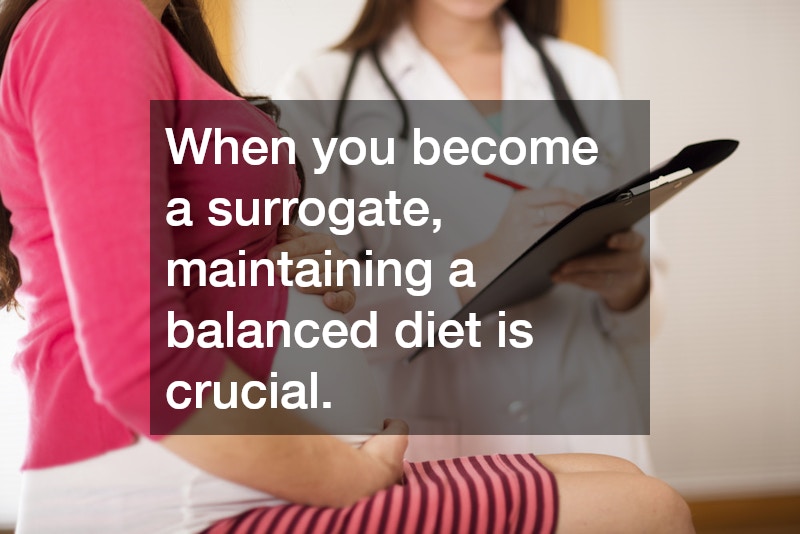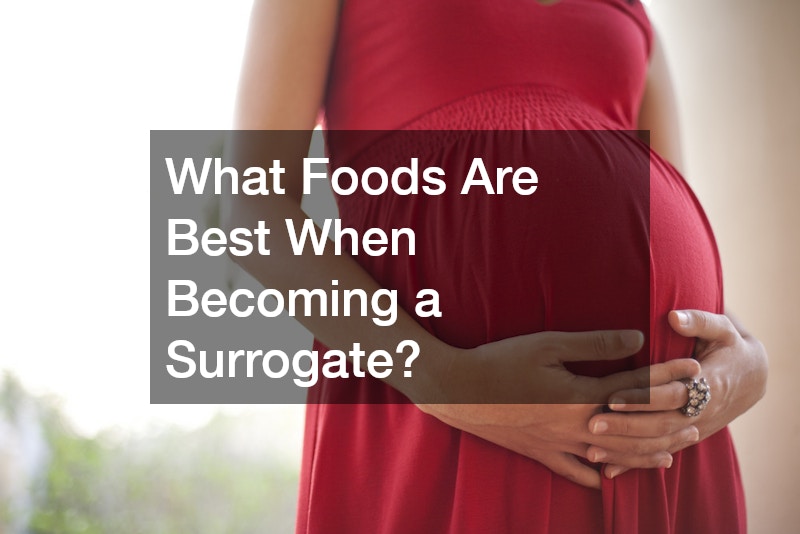The journey to become a surrogate mother is both rewarding and challenging. It requires you to ensure both your body and mind are healthy and prepared. One critical aspect of preparing your body for this journey is eating the right foods. A nutritious diet not only supports your overall health but also helps in sustaining the healthiest environment possible for the developing baby.
This article explores the best foods to consume when becoming a surrogate mother, helping you to undertake this rewarding journey with ease.
Importance of a Balanced Diet
When you become a surrogate, maintaining a balanced diet is crucial. Eating a variety of foods from all the food groups ensures that your body receives the necessary nutrients. A balanced diet includes fruits, vegetables, lean proteins, whole grains, and healthy fats. These components contribute to a healthy pregnancy by providing essential vitamins and minerals such as folic acid, iron, calcium, and omega-3 fatty acids. Moreover, consuming a balanced diet helps in managing weight gain during pregnancy, ensuring both you and the baby remain healthy.
Surrogacy requires a stable environment for the baby, which can be achieved through a balanced nutrient intake. A diet high in saturated fats or sugars can lead to complications, such as gestational diabetes or high blood pressure, which could affect the surrogacy process. Therefore, choosing a diet rich in complex carbohydrates, proteins, and fats from sources like nuts and fish can be beneficial. These nutrients not only provide energy but also reduce the risk of pregnancy-related complications. Continuing such a diet throughout the surrogacy journey promotes better health for both the surrogate mother and the baby.
Furthermore, a balanced diet can boost emotional well-being, which is vital when you become a surrogate mother. Emotional health is equally important as physical health on this journey. Nutrients such as omega-3 fatty acids found in fish and seeds are known to enhance mood and reduce anxiety levels. Keeping stress levels in check is important as excessive stress can negatively affect the baby’s health. Thus, a well-rounded diet serves as the foundation for a successful surrogacy experience.
Nutrient-Dense Foods to Include
Incorporating nutrient-dense foods is paramount when you decide to become a surrogate. Foods rich in folic acid, such as leafy greens, beans, and fortified cereals, are crucial for fetal development. Folic acid helps in preventing neural tube defects, which are serious birth defects of the spine and brain. Calcium-rich foods, like dairy products or plant-based alternatives, ensure the proper development of the baby’s bones. Similarly, Vitamin D, found in fortified products and through safe sun exposure, works in conjunction with calcium to promote bone health.
Adequate protein intake from sources such as lean meat, eggs, and legumes supports the growth and development of fetal tissues. Protein is a significant building block for bones, muscles, and blood. It also aids in repair processes within the mother’s body, making it an essential component of the surrogate’s diet. Incorporating iron-rich foods like spinach, red meat, or iron-fortified cereals is essential to prevent anemia, a common occurrence during pregnancy. Anemia can cause fatigue and complications during delivery, which needs to be avoided for the surrogate mother’s well-being.
Fruits and vegetables are vital to include due to their high content of vitamins, minerals, and fiber. Fiber helps in maintaining a healthy digestive system, preventing constipation—a common issue during pregnancy. Fresh produce provides antioxidants, which protect both the surrogate and the baby’s cells from damage. Incorporating a variety of colored fruits and vegetables ensures a diversity of nutrients. These nutrients play a role in supporting immune function and the general health of the surrogate mother and the baby.
Foods to Avoid or Limit
On the path to becoming a surrogate mother, knowing which foods to limit or avoid is as important as choosing the right foods to eat. It’s advisable to eliminate alcohol and caffeine from your diet due to their potential risks to the unborn baby. Alcohol consumption can result in fetal alcohol syndrome, which can cause developmental issues. Excessive caffeine can increase the risk of low birth weight and preterm labor. It’s often recommended to limit caffeine intake to 200mg per day, equivalent to one 12 oz cup of coffee.
Unpasteurized dairy products and certain seafood should also be avoided due to the risk of exposure to harmful bacteria like Listeria and mercury. These contaminants can lead to severe foodborne illnesses that could impact both the surrogate and the baby. Instead, opt for pasteurized products and safe, mercury-lower fish options like salmon or sardines. Understanding the sources of food and how they are prepared can drastically reduce risks. Choosing foods wisely ensures your surrogacy journey remains healthy and uncomplicated.
Furthermore, processed foods containing high levels of sodium and trans fats should be consumed in moderation. These substances contribute to hypertension and other cardiovascular issues, not conducive to a healthy pregnancy. Foods high in sugar, such as cakes, cookies, and sodas, should also be limited due to the risk of gestational diabetes. Opting for natural sugars found in fruits is a healthier alternative that satisfies sweet cravings. Being aware of these potential setbacks helps in maintaining an optimal health state while you become a surrogate mother.
Embarking on the journey to become a surrogate mother is a commendable decision, demanding attention to numerous details, not least of which is dietary choices. Opting for a balanced, nutrient-rich diet supports both the health of the surrogate and the developing baby, ensuring the experience is rewarding as well as safe. By including nutrient-dense foods while avoiding potential dietary hazards, you contribute significantly to the health and well-being of the baby. By prioritizing nutrition, you create a healthier environment, making the surrogacy process successful and fulfilling. Careful preparation and informed choices enable a smoother journey, providing peace of mind and optimal health outcomes.


